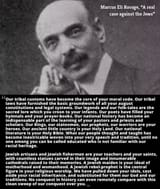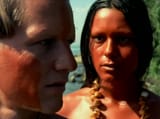Can you recommend me a book about getting colonized by another culture and having the spirit of your culture basically destroyed and getting absorbed into another culture? The desperate attempts to assert oneself with the old ways against the new ways which have dominated your culture? Or books with a similar feel?
It doesn't even have to be about colonialism, it can be anything where "new culture replaces old culture and people who previously had respect don't have it anymore", even if that new culture is just an advancement of the same culture and not a colonizing one.
I read "Things fall apart" by Achebe but idk I was expecting more
Anonymous
8/5/2025, 7:10:43 PM
No.24613169
>>24613189
>>24614341
any book on the American Indian Wars. Apache, Comanche, Cherokee, Shawnee, Lakota, Wampanoag, Pocasset, any book. Realer than anything you'll read in some faggy book.
Lear - Radical Hope
Faulkner if you don't like Indian shit.
Anonymous
8/5/2025, 7:10:58 PM
No.24613172
>>24613165
cots isn't about OP post its french cuckold fiction written about a jeetpocalypse
Anonymous
8/5/2025, 7:11:04 PM
No.24613173
>>24613189
>>24613156 (OP)
On the marble cliffs - ernst Jünger
Comes close enough. Give it a try.
Anonymous
8/5/2025, 7:14:17 PM
No.24613180
>>24613189
“A Bend in the River” by V. S. Naipaul
Anonymous
8/5/2025, 7:17:14 PM
No.24613189
>>24613173
>>24613169
>>24613180
thank you frens I really appreciate it
Anonymous
8/5/2025, 7:34:57 PM
No.24613236
>>24613248
>>24613156 (OP)
>Achebe
That's just the first volume of the African trilogy. The 'more' it seems you want are vs 2 and 3
Anonymous
8/5/2025, 7:42:03 PM
No.24613248
>>24614262
>>24613236
Does it get better? I wasn't that impressed by it. The last page of the book was probably the best part of it. The rest was meh, kinda interesting to learn about historically but the writing wasn't anything amazing.
Anonymous
8/6/2025, 1:08:34 AM
No.24614262
>>24613248
I thought it interesting that he didn't idealize the native past at all. The whole momentum of the book was that the old ways were doomed, and so they get crushed. Real colonization, however, begins right at this point: in the manner of changes that accrue *after* the triumph of Christianity, and this is what the final books explore. What's interesting about these books are the fairness of their exposition
Anonymous
8/6/2025, 1:12:07 AM
No.24614273
The Darkening Age by Catherine Nixey
The Final Pagan Generation by Edward Watts
Jon Kolner
8/6/2025, 1:24:17 AM
No.24614334
>>24613156 (OP)
The travels of Hans Staden in Brazil in 1557 as well as the film - How tasty was my little Frenchman? are perfect answer to your question and I really hope I get you interested enough to seek them out.
In this incident, the European was the foreign mercenary who came to America when the natives were divided between protestant french forces headed by subjects of John Calvin and the more militaristic forces of Portugal. The french mercenary after being taken in by the ‘savages’ grows acquainted to their culture before being overwhelmed by it. He had a tribal wife who loved him and he befriended the chief by helping defeat their enemy, the Tupiniquins. He was under the “European” assumption that fighting valiantly for the natives and being loved by the woman would allow them to work with him and let him go free but NO! These events, in this culture he is now subsumed under only lead to his demise as his great prowess in battle makes him target for cannibalism so as to give the chief his powers, likewise his wife wants him to die as their love under these customs would mean killing and eating her husband the most honorable form of love imaginable, an idea totally horrendous and absurd to European Christians. Only at the last moment does the Frenchman become totally subsumed in this new culture which overtook him and realize his gruesome mistake that what he thought would set him free (acting honorably in Christian standards) only makes him target for death in this foreign world.
Please read this blog analyzing the film and travel book
https://hollywoodandhistory.wordpress.com/tag/how-tasty-was-my-little-frenchman-film-1971/
>The best portrayal of this prejudice and misconstruction of native culture is Staden’s representation of women. The Frenchmen finally realizes his role as a husband, physically and mentally, when his wife shoots him with an arrow to prevent him from escaping. This scene in the film makes his wife look like the worst culprit of his demise. Staden’s and other European publishing’s of native women depict them in the same light; “the females are represented in both prose and illustration as the most savage of the savages.”[11] Sexual antagonism is a stereotypical representation of women in a male-dominated society. Europeans depicted women and children as being inherently inferior and uncultured.
>Dos Santos does not inherently portray women as “most savage of the savages”, but rather as more concerned with an honorable death that would provide nourishment for her tribe. The Frenchmen fails to understand their “love” and makes another mistake by thinking in terms of European manners of love, promising to take her to Europe and show her a world she has never seen and giving her a “better” life. However, she thinks in a different manner, which involves eating her brave, valiant warrior. Santos depiction of their love story demonstrates the failure of the Europeans and their inability to
Anonymous
8/6/2025, 1:26:06 AM
No.24614341
>>24613169
I liked and got way more out of Radical Hope than I was expecting
Jon Kolner
8/6/2025, 1:26:52 AM
No.24614345
>The best portrayal of this prejudice and misconstruction of native culture is Staden’s representation of women. The Frenchmen finally realizes his role as a husband, physically and mentally, when his wife shoots him with an arrow to prevent him from escaping. This scene in the film makes his wife look like the worst culprit of his demise. Staden’s and other European publishing’s of native women depict them in the same light; “the females are represented in both prose and illustration as the most savage of the savages.”[11] Sexual antagonism is a stereotypical representation of women in a male-dominated society. Europeans depicted women and children as being inherently inferior and uncultured.
>Dos Santos does not inherently portray women as “most savage of the savages”, but rather as more concerned with an honorable death that would provide nourishment for her tribe. The Frenchmen fails to understand their “love” and makes another mistake by thinking in terms of European manners of love, promising to take her to Europe and show her a world she has never seen and giving her a “better” life. However, she thinks in a different manner, which involves eating her brave, valiant warrior. Santos depiction of their love story demonstrates the failure of the Europeans and their inability to understand and co-exist with the natives.
>Western civilization produced a different culture from that of Brazil, and with racial and religious euro-centrism, Europeans completely eradicated what they considered an inferior race almost as the Frenchmen in the film promised would happen to the Tupinamba before his demise and consumption. His last words reflect European genocidal impulses before having his head bashed in. The film forces the audience to confront the question: “Who are the real savages? The Europeans who wiped out a whole group of culturally different people due to imprecise testimonials of their cannibalism, or the supposed cannibals, the Tupinamba? What we don’t know is who ate whom, but what we do know is who eradicated whom.


